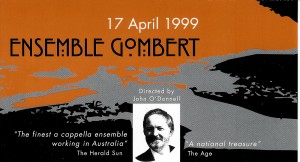Tuesday 14 December 1999, 8pm
Wednesday 15 December 1999, 8 pm
Xavier College Chapel, Kew
Subscription Concert 5
PROGRAM
Tomás Luis de Victoria O magnum mysterium
Tomás Luis de Victoria Quem vidistis, pastores?
Heinrich Isaac Puer natus est nobis
Nicolas Gombert Hodie nobis caelorum
Clemens non Papa Vox in Rama
Giovanni Pierluigi da Palestrina O admirabile commercium
John Sheppard Reges Tharsis et insulae
Orlande de Lassus Omnes de Saba venient
Tomás Luis de Victoria Senex puerum portabat
Giovanni Pierluigi da Palestrina Nunc dimittis (à 12)
William Byrd Mass for Five Voices with Propers In festo Purificationis:
William Byrd Susceptimus Deus
William Byrd Senex puerum portabat
William Byrd Diffusa est gratia
William Byrd Responsum accepit Simeon
Note: This was not the program advertised in the Subscription brochure, which was all Victoria
| SOPRANO | ALTO | TENOR | BASS |
| Deborah Summerbell | Jennifer George | Peter Campbell | Andrew Fysh |
| Carol Veldhoven | Margaret Arnold | Frank Prain | Tom Henry |
| Margaret Pearce | Barbara Tattam | Vaughan McAlley | Jerzy Kozlowski |
| Claerwen Jones | Stuart Tennant | ||
| Maria Pisani | |||
| Helen Gagliano |
–
REVIEW
Friday, 17 December 1999, The Age [Melbourne], page 6
The usual Christmas fare
Clive O’Connell
IN AN evening of Christmas music for the sophisticated, John O’Donnell’s Ensemble Gombert presented
another “Christmas to Candlemas” program, concluding yet another year’s recital cycle.
Here again was the usual compendium of seasonal music by famous Renaissance writers – Palestrina, Byrd,
Victoria, Lassus – with excursions into more arcane names like Isaac, Sheppard, Clemens non Papa and the
group’s namesake.
Some of the first half’s motets we have heard in previous years, such as Gombert’s Hodie nobis caelorum,
Victoria’s touching Senex puerum portabat and the massive motet for double choir by Lassus, Omnes de Saba
venient.
The group’s vocal mix has gained somewhat in depth and character since I last heard the ensemble in this
chapel. Both sopranos and altos maintain an authoritative clarity and sparkling, clear color rarely achieved by
other groups, and so startling when there is the slightest crack in this group’s vocal veneer.
While there are still three basses only, all have years of experience; even when the part is divided, their
voices provide a calm, non-blustery support for the rest of the forces.
The tenor quartet has a pair of well-matched voices and two that struggle to achieve security and ease of
articulation.
In the evening’s most vocally diffuse offering – Palestrina’s 12-part Nunc dimittis – one could pick out most of
the individual lines at various stages, but the tenors were the least discernible and definite.
Nevertheless, the program’s second half, comprising Byrd’s Mass for Five Voices interspersed with the
composer’s own Propers for the Feast of the Purification, showed the Gomberts at close to their best. The
voices rarely came under stress and the subtleties that grace each line at various points (notably the “Agnus
Dei”, a highpoint in Tudor music) were delivered without overstatement or unnecessary color.
Clive O’Connell/Courtesy The Age

